Dell U3014 LCD Review
by Chris Heinonen on April 15, 2013 2:00 PM ESTI'm not too surprised, but the U3014 sure does calibrate quite well. Using CalMAN 5.1 and targeting the sRGB gamut, 200 cd/m2 of light output, and a 2.2 Power Gamma Curve, we obtained some mighty fine results.
Grayscale performance went from fine to superb. We see almost no colorshift at all in the RGB balance, even down at 0%, and an average CCT of 6551. The Gamma is close to ruler flat with a small bump at 5%, but an overall average of 2.22, and our average grayscale dE2000 is just 0.64. Our contrast dropped slightly to 863:1, but that’s a small sacrifice for this grayscale performance.
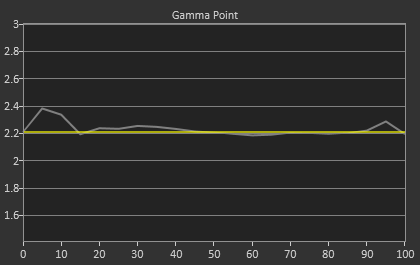
Colors were already good, but with the improved grayscale we dropped the average dE2000 down to 0.90. Color primary and secondary performance is pretty close to perfect here.
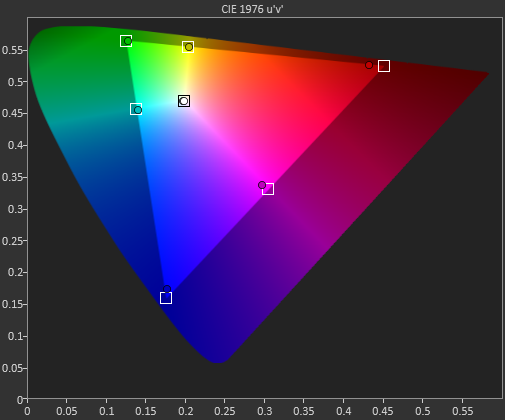
The Gretag chart saw a serious performance increase as well. Our average dE2000 is now 0.73, which means you can’t see any issues with the naked eye at this point. The tiny luminance errors are also totally gone, and if you’re looking for something to complain about on this chart, you’re going to have to keep looking. No error even gets close to 2.0, so this color is practically perfect.
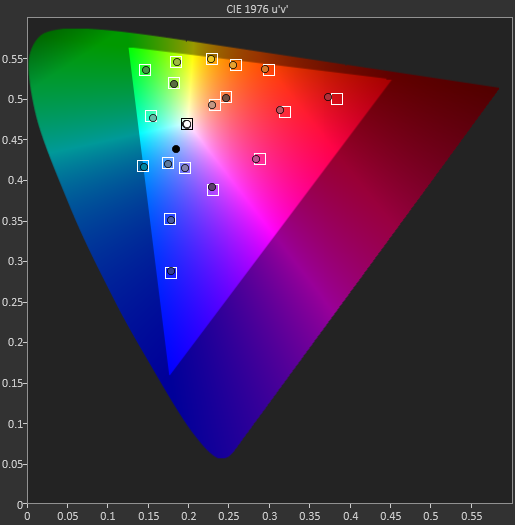
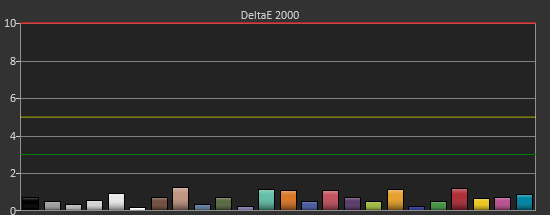

Saturations are just as perfect. Some numbers creep over a dE2000 of 1.0 but very few, and you can’t notice an error that small anyway. Unless you’re measuring with an instrument, it’s going to look perfect.

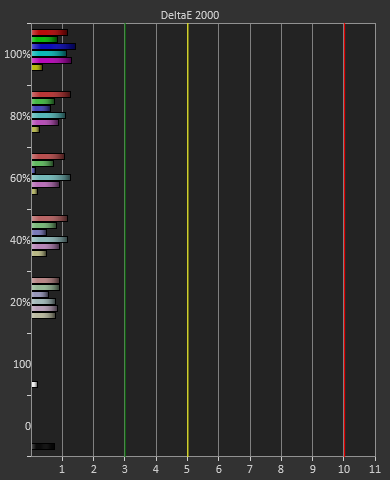
We also target print and photo applications, and for those we use the sRGB standards: 80 cd/m2 of light, and the sRGB gamma curve. Most of the numbers are directly comparable to the 200 cd/m2 numbers, so I’m going to focus on those that actually changed. First, the U3014 does a very good job of tracking the sRGB gamma curve. We can ignore the number, as unlike power the number varies across the curve, but we want to see how it lines up. The little bit from 0-5% where it doesn’t line up is likely because CalMAN can only measure those 2 points and would need to measure 1%, 2%, 3%, and 4% as well to track the curve better. Overall it tracks amazingly well, so it can do sRGB very easily.
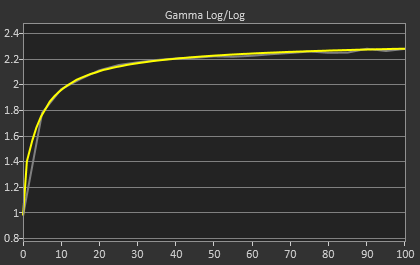
Our color errors are slightly larger, with Red and Blue both being slightly unsaturated in comparison to 200 cd/m2 though the error levels are still very low on average. They just aren’t as exceptional as they were at 200 cd/m2.
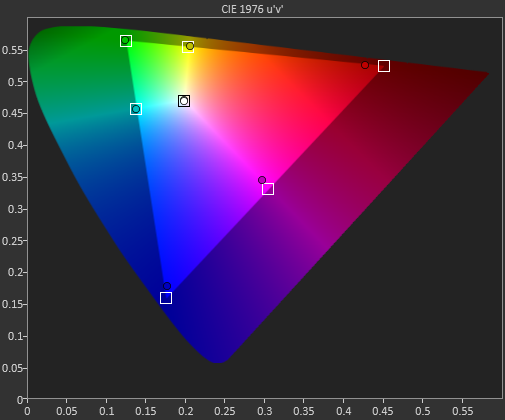
Finally we see that the saturations chart shows slightly more error as well, with some numbers creeping over 2.0 here. Even now they will still only be visible when directly next to the correct color sample, and even then it will be almost impossible to tell. For print and photo work, the U3014 will still work very well; it just seems to perform slightly better at high backlight levels.
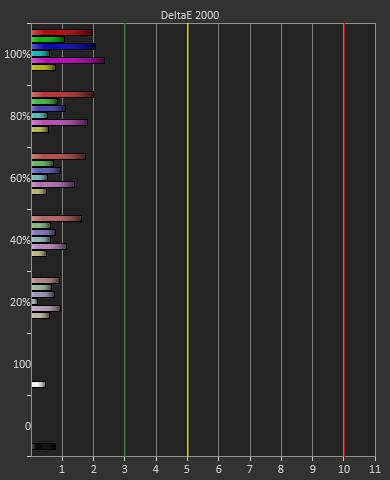


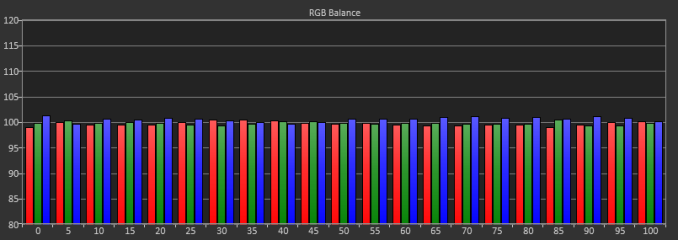
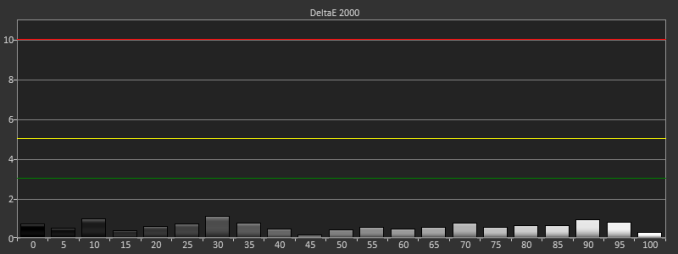











84 Comments
View All Comments
Dark_Eternal - Monday, April 15, 2013 - link
Small typo on page 2: "256x01600"dishayu - Monday, April 15, 2013 - link
Small typo in the table of 2nd page. "256x01600" should read "2560x1600". I wanted one of those korean 30 inchers just because it's hard to find good 16:10 IPS panels but sadly, for reasons i can not fathom, they are almost 2x as expensive as the 27 inch 1440p counterparts. So, i eventually ended up buying a 27 inch 1440p panel. Although i'm delighted by my choice nowas this "QNIX QX2710" samsung PLS display that i bought is capable of 120Hz at 1440p without any mods and it's going for 289$ on ebay as i speak.Sabresiberian - Monday, April 15, 2013 - link
Have you actually clocked it @ 120Hz?dishayu - Tuesday, April 16, 2013 - link
I have a shitty GPU (HD6670) so i get artifacting in fast moving scenes at 120Hz. I'm running this at 108Hz currently and it works flawlessly.MikeMago - Tuesday, April 16, 2013 - link
Love my job, since I've been bringing in $5600… I sit at home, music playing while I work in front of my new iMac that I got now that I'm making it online.(Click Home information)http://goo.gl/0jMj1
Proph3T08 - Wednesday, April 17, 2013 - link
How is the input lag on the QNIX?Zibri - Friday, April 19, 2013 - link
Try the HP ZR30W. 2560x1600 wide gamut. There's also a great review here on anandtech.extide - Monday, April 15, 2013 - link
Have you noticed any motion artifacts (possibly due to the excessive? pixel overdrive used on this display in an attempt to decrease the advertised pixel response time)See this thread for more info: http://hardforum.com/showthread.php?t=1754377
Senti - Monday, April 15, 2013 - link
Indeed, we need usability in review, i.e. overdrive artifacts are way more important than initial color accuracy. Dell U2713H looks great on paper unless you see the movement artifacts. NEC PA271W was pretty awful in this aspect too.layte - Wednesday, April 17, 2013 - link
Hi. I'm the guy whose Dell forum post was quoted in the HOCP forum post. Dell don't want to know at all about this issue. It would be good if AnandTech could put some pressure on them about the hideous pixel overdrive they have set as default.The mouse cursor on a white background is bad enough, but grey to grey is especially bad because of the overdrive.